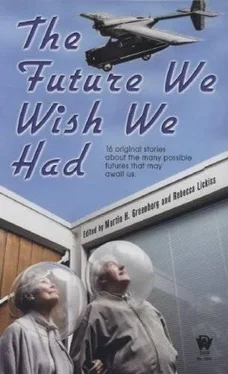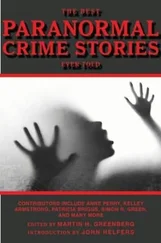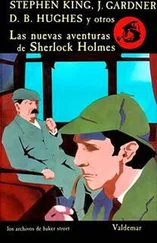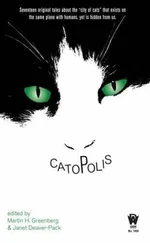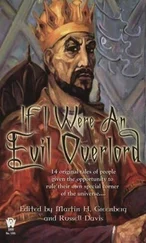“Is this a joke?” Gil asked.
“No.” Dr. Wyatt spoke solemnly, reassuringly. “A handful of other couples all over the country have done this already, but cases like this are very rare.”
Alden stirred. His small fist grabbed the fluttering edge of the blue blanket, and he pulled it toward his mouth, uncovering his tiny feet, encased in delicate white socks. Ro grabbed the blanket and pulled it down, covering him again.
“What does the clinic get out of this?” Gil asked.
Dr. Wyatt shrugged. “A percentage. Small, actually. It amounts to one percent of the total fees paid your family.”
“Plus all the payments for the additional medical care,” Gil said. His anger was becoming plain. His voice was rising.
“What-?” Ro asked, loudly enough to cover him. He shot her a warning look which she ignored. “What does this mean for Alden?”
“Financially?” Dr. Wyatt said. “It means that he’ll-”
“No,” she said. “What will happen to my baby? Are there tests? Will he have to leave us?”
“No,” Dr. Wyatt said. “At his checkups, we’ll take an extra vial of blood, and send it to whichever lab ends up with his case. He won’t notice a thing.”
“Those are his genes, right?” Gil asked. “Do we have to give consent every time they’re used?”
Dr. Wyatt looked at his long, manicured hands. “If you do this,” he said, “Alden’s genes will no longer be his. They will belong to the firm that buys them.”
“Meaning they could do anything they want with his genes?” Ro asked.
“Yes,” Dr. Wyatt said.
“Will he be prevented from using his genes?” Gil asked.
“They have a waiver for reproduction,” Dr. Wyatt said. “But if he wanted to donate sperm or give blood, he would need permission. And he would need their permission if he wanted donate an organ or grow one for a family member who couldn’t for some reason.”
Ro shuddered. Such a decision. She had expected to make one today, but not like this.
“Would they clone him?” she asked.
“Cloning is illegal throughout the world,” Dr. Wyatt said.
“But we’ve heard rumors-”
“No reputable company would clone anyone,” Dr. Wyatt said, “although they might use a section of his DNA as a template for some infant’s flawed DNA.”
“How much would we get paid?” Gil asked.
“For Alden?” Dr. Wyatt shrugged. “The usual bid starts at two million dollars. It can rise from there.”
“And how long would they control his genes?”
Dr. Wyatt’s mouth formed a thin line. “For life,” he said.
***
They did not have to make a decision right away. All they did was ask Dr. Wyatt to wait before informing any of the companies about Alden. Dr. Wyatt agreed. They were to see him again in two weeks.
During that time, they spoke to everyone they knew. Their friends had split opinions: some felt that Alden’s gift should be used for the greater good; others believed that to give Alden’s DNA away would be to tamper with God’s plan. Their more sophisticated friends worried about the legalities. Their families worried about the restrictions.
Gil hired a lawyer who specialized in medical contracts. The lawyer believed she could negotiate a more favorable document that gave less power to the biotech company and more money to the family. She would take the case on a contingency, agreeing to work for a percentage of the final take. Gil had been satisfied with her, but Ro hadn’t. When they had gone to the lawyer’s office, she hadn’t done more than give Alden a cursory glance. No questions about him, no gentle touches, and when he woke grumpy after a long nap, she requested that he either get quiet or be taken to the daycare center thoughtfully provided by the legal firm.
It was starting to become about money. Two million dollars would pay off all their debts, including their tiny one-story home in a distant suburb. It would pay for Alden’s college, his graduate work, and, if they invested wisely, give him a nest egg, an investment that might help him as he grew older.
Ro walked through her tiny house with its unwieldy ’90s kitchen with the island that always got in her way and the hooks for the cooper pots that no one had anymore, and imagined it updated, with modern appliances. She fed Alden in the living room, always chilly because of its cathedral ceiling, and wished that she could carve the space into two rooms-one of them a playroom for her beautiful son. Gil mentioned in passing, as he always did with things that were important to him, that perhaps they could consider buying a bigger house with a real yard, close to schools and public transportation. They allowed themselves to contemplate a different life.
And through it all, they fed Alden, changed him, played with him, and held him. They carried him from room to room as they dreamed their small dreams. Sometimes he giggled. Often he slept. And sometimes he cried so hard that Ro thought his heart was breaking. During those times, she couldn’t understand what he needed, and she wished, oh how she wished, she could ask him what he wanted.
Because their decision would affect him in a thousand ways. It would affect everything about him, from simple acts of charity such as donating blood to large things such as his financial future. Ro did not even think about the added offer, the way that the companies would pay for more children, the way that all of this would affect their lives.
She studied everything she could find, became familiar with genes and DNA and experiment processes. She learned that Alden was one of a select group. Less than point one-one hundredth of all the children born since the human genome project had been finished were categorized as medically perfect. Of that small percentage, only a few were born in the United States each year. There was no information on families who had chosen the options she and Gil had been offered, except short mentions in various papers that people had taken those offers. Nothing about the parents, about how they made the decisions, about how they felt later.
***
Two nights before she and Gil were to talk again with Dr. Wyatt, she sat in Alden’s room. The room smelled of talcum and baby, and was silent, except for Alden’s even breathing.
They had remodeled the walk-in closet beside the master bedroom as the nursery, thinking that later they would give Alden a room farther from theirs. The nursery was small but bright, with a balloon mural on the wall that Gil had painted and matching pillows all over the floor, sewn by her mother. White baby furniture completed the look. They had modern smarthouse equipment in here and in the master bedroom, an expense that Ro had insisted on when she became pregnant. No old-fashioned baby monitors for her. She wanted the very walls to listen to her child, to make sure he was all right every moment of every day.
Still, she sat often in the rocker her grandmother had given her and watched Alden sleep. Ro did her best thinking when Alden slept. She remembered her fear of becoming one of those mothers, with a diseased child, a woman who clung to her baby hoping to give it life.
Alden had life. He had more than life. He had, genetically speaking, a life that would be healthy and full. He was the opposite of those children.
Something in that thought held her. She had come to it over and over again in the last ten days. She was approaching her child because of what he had instead of who he was, and she had always thought that wrong.
Alden was a joyful baby. Everyone said that. And they said how lucky she was. He could have been naturally cranky or energetic or listless. He could have been so many things, but he was not. He was born with a mind and a personality all his own. It was up to her-her and Gil-to help him develop those things.
Читать дальше
